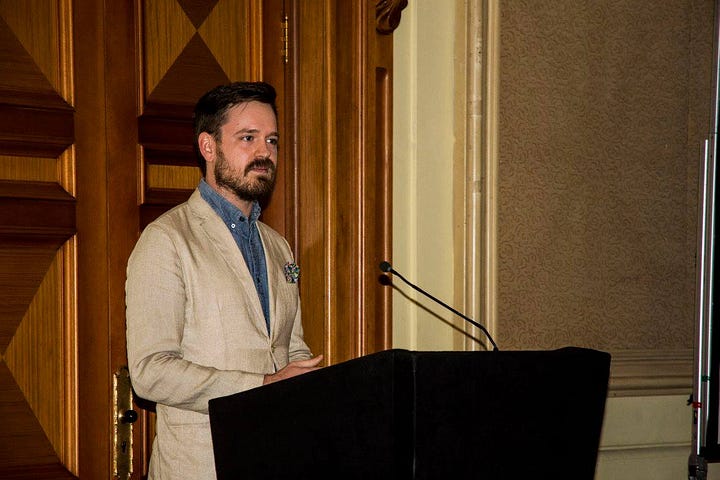"Unique and Invaluable" Ties Between the U.S. and the World
Fulbright scholarship recipients from UMW speak on the value of the program, which the Trump administration has thrown into limbo.
By Adele Uphaus
MANAGING EDITOR AND CORRESPONDENT
Email Adele


In 2013, University of Mary Washington graduate Eric Halsey went to Bulgaria on a Fulbright scholarship. Thirteen years after the scholarship ended, he still lives in the southeast European country—but that doesn’t mean he’s turned his back on the U.S.
“I've since worked for several Bulgarian startups, helping them enter the U.S. market and build ties between the two countries,” Halsey wrote in an email to the Advance. “I ultimately started my own company, helping U.S. clients shape their communication strategies.”
He also hosts local pub quizzes that raise money for in-home care for disabled children, serves on the Fulbright board to help the organization better serve the U.S. and Bulgarian taxpayers, started a podcast to educate the world about Bulgaria's history, and “finds any other way to give back to both Bulgaria and the U.S.—my two homes.”
For Halsey, that’s the transformative power of the Fulbright scholarship for both individuals and the global community. But the scholarship program—which was established in 1946 by Senator J. William Fulbright, is sponsored by the U.S. Department of State, and is the government’s “flagship program of international educational and cultural exchange,” according to its website—was shaken up earlier this month when 11 out of the 12 board members resigned, citing political interference by the Trump administration.
The board members’ resignation letter, according to a June 12 NPR article, says the administration rescinded “a substantial number” of Fulbright scholarships from individuals who had been selected to receive one, and subjected over 1,000 foreign Fulbright recipients to “an unauthorized review process.”
According to the article, the board members’ letter stated that awards in subject areas including architecture, biology, engineering, agriculture, animal science, medical sciences, music, and history were revoked, and it accused the administration of “injecting politics and ideological mandates into the Fulbright program.”
In addition, the administration’s budget for next fiscal year proposes cutting $691 million from the state department’s Bureau of Educational and Cultural Affairs, which administers the Fulbright program.
There are several components to the Fulbright program. The Fulbright Scholar fellowships are for academics and professionals, and according to the website, each year they enable 800 U.S. Scholars to go abroad and 900 Visiting Scholars to come here.
There’s also a program for graduating college seniors, graduate students, and early-career professionals, allowing them to pursue graduate study, conduct research, or teach English abroad.
About 30 alumni of UMW—including Halsey—have won these scholarships over the last 20 years, said Nabil Al-Tikriti, professor of middle east history at the university.
“We have had three winners [per year] at least twice,” said Al-Tikriti, who is the Fulbright Program Advisor at UMW. “That puts us sort of in the national rankings. And we would love to see more.”
On June 11—the same day all but one of the Fulbright board members resigned—UMW published a profile of Sofia Taylor, who won a scholarship for the 2025-26 academic year to study music and neuropsychology at the Max Planck Institute for Empirical Aesthetics in Frankfurt, Germany.
Taylor confirmed to the Advance last week that she still has her scholarship.
Al-Tikriti himself is a three-time Fulbright Scholar. Four other UMW faculty have also won Fulbright Scholarships, including Chris Kilmartin, a psychology professor who retired from the university in 2016.
Kilmartin spent one semester as Distinguished Chair of Gender Studies at the University of Klagenfurt in southeastern Austria. While in Europe, he gave guest lectures at larger universities in Salzburg, Vienna, Heidelberg, and Hamburg, which helped the smaller host university with its name recognition. And his experience of being embedded in another culture and not speaking the language enabled him to help his students understand implicit bias.
But the benefits of the Fulbright program go beyond the personal, Al-Tikrit said.
“We should always remember that Fulbright does not just send American recent college graduates to other countries—it also brings foreign students and professors of the U.S.,” he said, creating ties of trust and diplomacy between countries.
There are Fulbright opportunities in 160 countries around the world, operated in partnership with the host country and often financially supported by the host country.
According to a May statement on the administration’s budget proposal by the Alliance for International Exchange, partner governments contribute “over $100 million annually” to the program.
The program also receives funding from Congress through the annual appropriation bill. According to a June 21 opinion by Christie Warren, a Fulbright Scholar and professor at William and Mary Law School, the annual budget for the Fulbright Program is $288 million, “representing a minuscule share of America’s international relations budget.”
The average amount of a Fulbright scholarship is $50,000, Al-Tikriti said.
“That’s not a huge amount of money compared to the cost of a single, well, pick your weapon,” Al-Tikriti said. “One tank is $1 million. So you can have one tank, or you can have 20 people with international connections and international knowledge. And each one of those 20 people can challenge an assumption that is incomplete, or give a mature explanation of the effects of our own foreign policy, which has global implications.”
Al-Tikriti noted that there is also a hiring preference in the federal government for student Fulbright recipients.
“An awful lot of Fulbright grantees go on to work in the foreign service, or the dearly departed USAID, or the Pentagon, or any other international programs within the U.S. government,” he said.
But Kilmartin said the U.S. increasingly doesn’t think of itself as international, “and that’s not good for an increasingly diverse society.”
“Isolationism has never worked out for us,” he said. “It didn’t work out for George Washington.”
Halsey said his Fulbright scholarship made it possible for him to “build a life around service.”
“For the U.S., Fulbright is a program with decades and decades of history. All that work and investment has created an organization that's widely known and respected. That kind of image takes a tremendous amount of work to build and to destroy it to ‘save’ a tiny amount of money would be a terrible decision,” he said.
“There's no program like Fulbright in the world and each commission has been painstakingly built from the ground up as a partnership between the U.S. and the host country,” he continued. “The ties it builds between the U.S. and the world are completely unique and invaluable.”
Support the Advance with an Annual Subscription or Make a One-time Donation
The Advance has developed a reputation for fearless journalism. Our team delivers well-researched local stories, detailed analysis of the events that are shaping our region, and a forum for robust, informed discussion about current issues.
We need your help to do this work, and there are two ways you can support this work.
Sign up for annual, renewable subscription.
Make a one-time donation of any amount.
Local Obituaries
To view local obituaries or to send a note to family and loved ones, please visit the link that follows.
This article is published under Creative Commons license CC BY-NC-ND. It can be distributed for noncommercial purposes and must include the following: “Published with permission by FXBG Advance.”













